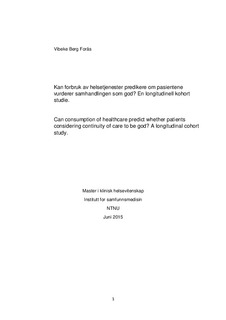Kan forbruk av helsetjenester predikere om pasientene vurderer samhandlingen som god? En longitudinell kohort studie.
Master thesis
Permanent lenke
http://hdl.handle.net/11250/297676Utgivelsesdato
2015Metadata
Vis full innførselSamlinger
Sammendrag
Background: People with chronic illnesses may require many different healthcare
services and there is need for coordination between these services. The purpose of
this thesis was to investigate whether consumption of healthcare can predict patients'
experience with continuity of care between healthcare services they have had contact
with over a two year period.
Methods: Longitudinal prospective cohort study based on data from three registry of
healthcare consumption in primary and specialist healthcare over two years, and a
questionnaire sent four months later. The dependent variable was how respondents
assessed the continuity of care, and the independent variables were the various
health services within primary and specialist healthcare services, as well as gender,
age, education and health status. The data were analysed descriptive and by logistic
regression analysis.
Results: Of 12,500 invitees, there were 2,983 who responded to the questionnaire.
Response analysis showed that there were only minor differences in responders and
non-responders, the main difference was that the responders were older. The main
finding in the study is that age predicts for consensus with continuity of care. The
youngest are least satisfied with a significant odds ratio of 2.3 (95% CI 1.5 to 3.6, p
<0.001) and the oldest are most satisfied with a significant odds ratio of 7.2 (95% CI
3, 7 to 13.2, p <0.001). Higher education, those living alone and self-reported poor
health and chronic illness predicts less agreement with continuity of care to be good.
Conclusions: The main finding is that age predicts whether patients considering
continuity of care to be good by the oldest are most satisfied. Health condition
predicts the assessment of continuity of care to a certain extent and that consumption
of health care has negligible effect for the assessment of continuity of care.
Relevance: Healthcare services focuses on diagnoses instead of being
patientcentered and the healthcare service is far from being seamless. It is important
to examine how patients considering the continuity of care. It is the patients
themselves who are present and experiencing the entire care pathway, and they
should be more included in the way that questions being asked at the patients level.
